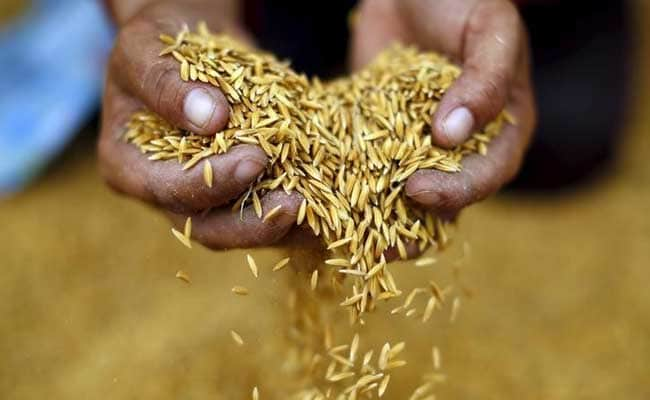
If people devour an excessive amount of nitrate of their diets, it is able to intervene with the ability ofred blood cells to transport oxygen in the body, the report said. (Reuters picture)
NAIROBI, KENYA: As they battle to cope with extra excessive climate, a range of meals plants areproducing more of chemicals that may reason health troubles for human beings and livestock whoconsume them, scientists have warned.
a new document by using the United nations surroundings Programme (UNEP) says that plants which includes wheat and maize are producing extra capacity pollutants as a reaction to protect themselves from intense weather.
but these chemical substances are harmful to humans and animals if consumed for a extended time frame, consistent with a file launched during a United countries surroundings meeting assembly in Nairobi.
“vegetation are responding to drought conditions and will increase in temperature similar to humans dowhilst confronted with a stressful situation,” explained Jacqueline McGlade, leader scientist and director of the division of Early warning and assessment at UNEP.
under everyday situations, for instance, vegetation convert nitrates they absorb into nutritious amino acids and proteins. but prolonged drought slows or prevents this conversion, leading to greaterdoubtlessly intricate nitrate accumulating within the plant, the report said.
If people devour too much nitrate in their diets, it may interfere with the potential of pink blood cells to move oxygen in the frame, the record stated.
plants susceptible to accumulating an excessive amount of nitrate in times of stress encompass maize, wheat, barley, soybeans, millet and sorghum, it stated.
DROUGHT, THEN RAIN
some drought-harassed plants, whilst then uncovered to sudden massive quantities of rain that lead torapid growth, in flip gather hydrogen cyanide, more normally referred to as prussic acid, the report said.
Prussic acid – one of the components used in a few types of chemical conflict – interferes with oxygen go with the flow in human beings. Even quick–term exposure can be debilitating for people, McGlade said.
plant life along with cassava, flax, maize and sorghum are maximum liable to dangerous prussic acid accumulation, the file stated.
instances of nitrate or hydrogen cyanide poisoning in people have been reported in Kenya in 2013 andwithin the Philippines in 2005, McGlade said. In Kenya, two kids died in coastal Kilifi after eating cassava that had raised ranges of prussic acid in it following excessive rainfall, in line with neighborhood mediareviews.
Aflatoxins, molds that can affect plant plants and raise the threat of liver harm, most cancers and blindness, in addition to stunting foetuses and toddlers, also are spreading to more regions as a result ofshifting climate patterns as a result of climate change, scientists said.
McGlade said approximately 4.5 billion human beings in growing countries are uncovered to aflatoxinseach 12 months, even though the quantities are in large part unmonitored, and the numbers aregrowing.
“we are just beginning to realise the magnitude of toxin- related troubles confronting farmers in growingcountries of the tropics and sub-tropics,” the report stated.
“As hotter weather zones increase toward the poles, nations in extra temperate regions are going through new threats,” it introduced.
In 2004, Kenya suffered intense outbreaks of aflatoxin poisoning, which affected extra than three hundredpeople and killed more than a hundred following a extended drought, according to the worldwidelivestock research Institute.
EUROPE AT hazard
The UNEP report said Europe may be at developing risk from aflatoxins in domestically grown vegetationif global temperatures upward thrust through at the least 2 stages Celsius. the world is currently on acourse to a more than 3 diploma Celsius temperature upward push, scientists accept as true with.
An growth in poisonous compounds in crops is possibly to impact closely on the world‘s health system,which can be already suffering with the outcomes of food insecurity, Dorota Jarosinska of the worldhealth company‘s european center for surroundings and health stated in an interview with the Thomson Reuters basis.
Alex Ezeh, govt director of the African populace fitness and studies center, said the boom in toxins inplants changed into a massive situation.
“toxic vegetation can cause neurological diseases amongst people however the finest mission is theoccurrence of cancer,” he stated in an interview.
The report proposes a listing of eight thoughts farmers and agricultural professionals can undertake totry and restrict harm from extra crop pollution, together with mapping contamination hotspots andconstructing better evidence approximately what is going on now with the pollution of their vicinity.
Scientists also recommend that developing crop types designed to cope with severe weather ought tohelp lessen the ranges of toxic chemicals in food.
“studies facilities with the Consultative institution on worldwide Agricultural research are growing seedswhich can be appropriate in numerous regions that have been hit by way of climate exchange,” McGlade said.
